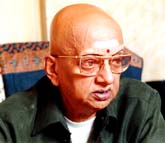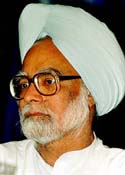'Because a multinational is permitted to open a
shop to sell chicken, does that mean it
is
Kentucky Chicken culture?'
 Cho Ramaswamy, actor, commentator,
journalist, and now television personality, discusses the
state of India 50 years after it won freedom.
Cho Ramaswamy, actor, commentator,
journalist, and now television personality, discusses the
state of India 50 years after it won freedom.
A candid conversation on India's leaders, its people, its
future, and, of course, corruption, liberalisation and secularism,
with Shobha Warrier.
What is the biggest threat India faces now? Lack of morality,
especially political morality, or the gap between the haves and
have nots?
The greatest threat is the lack of attention to the rural areas.
More than the gap between the haves and have nots, more than all
the other differences, the difference between urban areas and rural
areas is getting more and more accentuated. This will result
in the migration of rural people to urban areas. This
will pose problems to both the rural and urban areas.
Not only that, it will also lead to unrest. Development activities should be
concentrated on the rural areas. I wouldn't be sorry if the government
holds up for a while the development of urban areas and concentrates
on rural areas.
Another (threat) is lack of good education to the deprived classes. Now
they are being sent to corporation and panchayat schools. There
cannot be worse places for learning. So many undesirable activities
take place there. The deprived clases are not going to be benefitted
by reservation. If you pamper them with reservation,
it will only weaken them further. What should be done is, they
must be provided with the best possible education -- the kind of
education that is provided to the elite.
You cannot expect
them to be good at learning if they are asked to live in the slums.
The moment they go back to their homes, they are going to experience
things which are totally nonconducive to education, like gambling,
petty thieving, rowdism etc. So they must be provided
residential schools. This must be done, whatever the financial
implications.
Industrial houses will definitely come forward to
help. Industrial houses which
are willing to participate in this exercise should be given some
concessions. If this is done, in 15 years, they will be
on an equal footing with the privileged classes. And the
necessity for reservations will go.
Why cannot we provide at least one square meal
to thousands of people in our country,
after 50 years of Independence?
The number one reason is population.
Even though overpopulation is the biggest problem that we
have now, why is it that no political party is taking any active
interest in it?
Most political parties get their votes from the under
privileged. The privileged classes do not go and vote at all.
They are so privileged that they couldn't care less about
what is happening to the country. The underprivileged are
concerned, so they go and vote. And they abhor family planning.
How could political parties dare advise them on smaller families?
Were you at any time influenced by Communism?
I have always been against Communism. In fact, one of the first
series of articles which I wrote in Tuglaq 26 years back
was titled 'Moscow - our capital' taking to task the then
Indira Gandhi government for being subservient to Moscow. I have
been against Communism because it is against the nature of man.
A talented man cannot be asked to be satisfied with what a man
totally devoid of talent is able to obtain from life. Communism
makes machines of men.
But what about social equality that is
advocated by Communism?
There is no equality in nature. You cannot go against it. Have
the Communists themselves been able to bring about the kind of
equality in society? They have provided themselves and members
of the Communist party with all comforts in Russia and in China.
How then can you say that they have brought about equaliity?
Capitalism has always been projected as anti-society and anti-poor
becasue it widens the gap between members of society.
It is not anti-poor. When capitalism thrives, the poor get
to be employed usefully and profitably.
Why are our intellectuals against capitalism?
It is the other way around. Those who are against capitalism
are supposed to be intellectuals. Those who advocate capitalism
are supposed to be reactionaries and not intellectuals. A reactionary
cannot be anything but an intellectual.
 Is the path paved by Dr Manmohan Singh through economic liberalisation
the right one?
Is the path paved by Dr Manmohan Singh through economic liberalisation
the right one?
Definitely. It should have been done much earlier. But
we must be careful about what areas we let foreign investment
in.
Do you think Dr Singh achieved something for the country through
his economic policies?
No doubt about it. He is the man who put us on the right
track. Of course, international conditions helped him.
There is considerable criticism about the Coke culture and Kentucky
Chicken culture invading India.
What is this Coke culture and Pepsi culture? Because a multinational
is permitted to open a shop to sell chicken, does that mean it
is Kentucky Chicken culture? Then would you call our culture, Idli culture?
Do we have Chappati culture? Or do you want Murgi culture?
By labelling something like this, you will not
win an argument. If you can have a Limca culture, you can have
a Coca-Cola culture. If you can have a Chappati culture, you can
have a Kentucky Chicken culture too.
Do you think that whatever Dr Manmohan Singh achieved through
his economic policies is lost because of the new government?
I'll tell you one thing. Manmohan Singh had an advantage. No
doubt he is a brilliant and honest man. He was not blocked on
all sides while he was operating. He had an almost free hand.
Whereas Chidambaram has to satisfy the Communists, he has
to satisfy the Janata Dal, he has to satisfy the ill informed
criticism of V P Singh. So he is pulled on all sides. He is answerable
to all and sundry. That is his problem. In spite of it, he is
operating.
Does that mean the economy is going to suffer?
It is suffering because of this government. Not because of
Chidambaram, but because of this government. In spite of Chidambaram.
When did corruption originate in India?
It was systematised and institutionalised in Tamil Nadu during
Karunanidhi's regime, and institutionalised all over the country
during Mrs Gandhi's time. But it existed much, much before that.
Kautilya's Arthasastra provides punishment for corrupt officials.
Not only to corrupt officials, but for judges who accepted bribes.
It would not have got mentioned in Arthasastra,
if corruption had not existed then.
Is it part of human nature to be corrupt?
Yes, it is so. But a successful society will be able to contain
it in such a way that it does not reach dangerous limits as it
reached in Tamil Nadu during Jayalalitha's days.
Why is it that we in India have started accepting corruption
as a part of our lives?
That is dangerous for society. Mrs Gandhi was right when
she said that it is a worldwide phenomenon. But in other countries,
corrupt politicians were punished. In India it was not happening.
Mrs Gandhi did not mention that crucial difference. But now they
are made answerable.
Will it make any difference?
Many people feel the politicians will go scot free
after all this fuss.
The State is capable of making the prosecution cases so weak
that they will be thrown out of courts. Then the courts will have
no other alternative but to throw the cases out. What happened
to the assault on advocate Vijayan? That could happen to these
cases also. The present administration may strike a bargain
with them and see that the cases are weak.
But it is for the first time that the corrupt politicians are
made answerable. So far even that had not happened.
At least now
they are interrogated. They are asked to appear in courts. They
are asked to face charges. How strong these charges are going
to be, how efficient and sincere the prosecution is going to be,
remains to be seen.
But the recent trend is to keep people in prison before the trial.
That is, they are punished before the trial. Take Chandra Swami.
I am no great fan of his, I don't even think he is a godly man.
That's a different matter. But he was kept in prison for six months
before the trial. He is already punished without a trial. Take
Sasikala. I have been criticising her. But that is no reason for
me to justify her being in prison for four months without a trial.
We have so many undertrials in prisons in India.
So far I have not followed up on this. I feel sorry for that.
These remand prisoners are kept with convicts. Is it right? These
people who are yet to face a charge, a trial, yet to be convicted
by a court are placed in the same cells with the convicts. There
should be a separate arrangement for them. That could even be
a multistoreyed apartment complex with all conveniences. It is totally unethical
on the part of the State to keep them along with the convicts.
|

